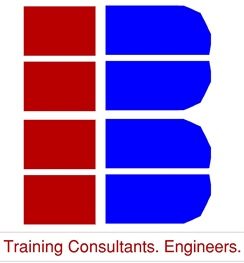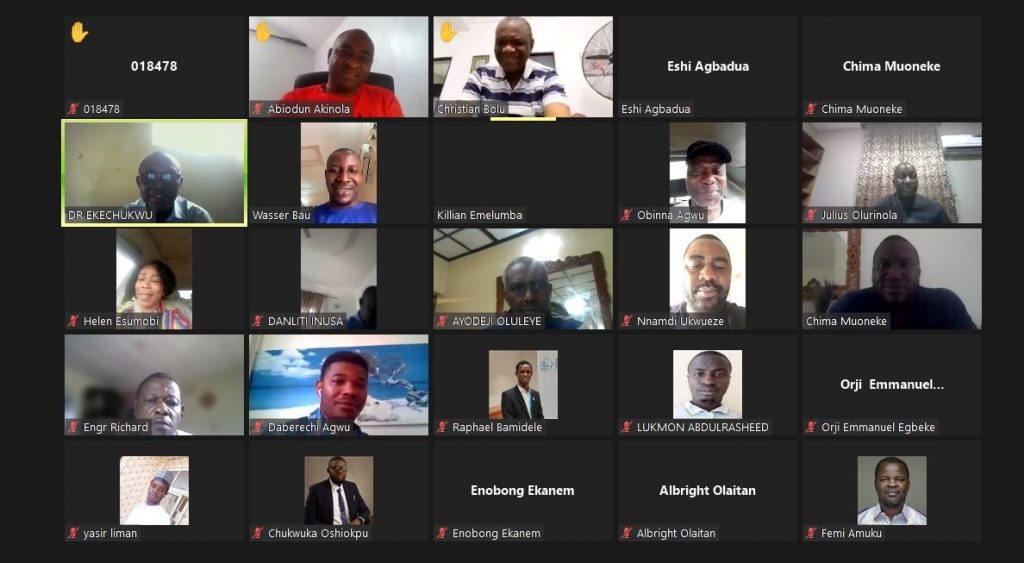Ornament Training Centre
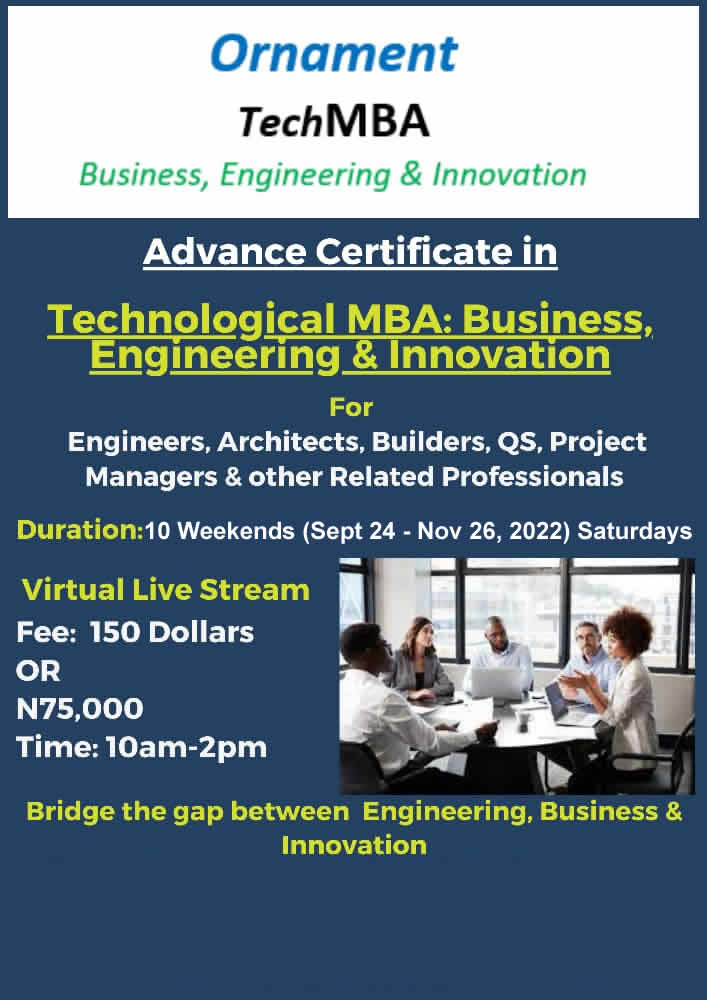
Advanced TechMBA in
Technological MBA, Business, Engineering & Innovation
| DATE: September 24 to November 26, 2022 (10 Weekends) Saturdays Only Saturdays: (10am – 1pm) Venue: Virtual Live Stream-Zoom Fee: N75,000 or 150 dollars Fee coves Certificates, Training materials, recorded videos and Excel Templates. Registration: To register in advance, make payment to Ornament Training Centre Acct. No: 1017161016 Bank: Zenith Bank and send payment details to 08140439427 on WhatsApp. You will then be added to the WhatsApp Group. The training link and materials will be shared a week to the start of the program. Background Engineering and other allied technological professionals find it difficult to easily integrate in the business world. The reason being that they are not exposed to business realm. They are vertical T-shape professionals and therefore lack the requisite business skills to navigate the dynamic business world. That is the major reasons many are trapped unemployed when jobs are not available. The idea of this technological MBA (TechMBA) is to introduce them to business engineering innovation which integrate business, engineering and innovation together. Business engineering is a technique in which traditional engineering principles are applied to the business world for innovation purposes. A business innovation engineer is a horizontal T-Shape interdisciplinary manager who guides companies from a quantitative and managerial point of view in order to grow a business from startup to unicorn. To this end, managerial and analytical skills are combined with a profound understanding of how business and (technological) innovation processes work. This training is for all engineers and other allied professionals. Deliverables 1. Business Engineering Introduction to business engineering The roles of a business engineer Why business engineering is important Horizontal and Vertical T-Shape engineers Bringing engineering, innovation and business 2. Business Analysis and Intelligence Business ideation and critical thinking Identification of business needs/frictions Development of business case Business Lifecyle assessments SMART and SWOT Development of business plan Pitching your business plan Advocacy and policy brief Introduction to business intelligence and analytics 3. Business Investment Appraisals and Financing Introduction to business investment appraisals Determination of appraisal ratios (PV, FV, NPV, IRR, CBR, ROI, SPBP) Introduction to business accounting Introduction to business financing Sources of business financing Capital structuring (Debt and Equity financing) Financial ratios Sources of cashflows to companies (Operation, Financing and Investment) 4. Business Product and Process Management Business product development Business Modeling and structuring Business change management Business cost management Business Risk management Business stakeholder management Business time management Business quality and procurement management Business legal structures 5. Entrepreneurship Strategy & Management Introduction to entrepreneurship Invention, innovation, prototype and proof of concept The entrepreneurship Curve and why it is important Strategy, value, competitive advantage Vision, mission, core value and goals Visionaries, SpaceX Business growth and transformation Design thinking Innovate in digital era with ICT tools Sustainable entrepreneurship Agile concepts and framework 6. Business Strategies for Growth Blue and red ocean strategies Reach beyond the best Humanness, confidence and creative competence Constructing the right ocean team Discovering an ocean of non-customers Uncovering the hidden pain points that limit the size of your business Reconstructing market boundaries Developing alternatives blue ocean opportunities Finalizing and launching your blue ocean move 7. Digital Product Marketing and Digital Service Marketing Identifying your customers Market survey and mapping (orientation, Mix, environment) Fundamentals of digital marketing Digital marketing strategy Digital marketing implementation Meeting customers satisfactions Product branding Advertising and social media E-business 8. Business Leadership and Management Different between leadership and management Leading yourself and others Cultivating strong leadership presence Effective decision making in a complex environment Lead with strategic business analysis tools and resources Consulting skills for leaders within organizations Emotional intelligence Productivity skills and tools for managers 9. Business Performance and Accountability Reporting Introduction to business performance and accountability Improve corporate cultures and boost performance Performance accountability reporting Business KPI/KBI 10. Build Strong Business Network and Grow to Unicorn Building strong business networking Business to Business (B2B) Business to Consumers (B2C) Business to Business to Consumers (B2B2C) Model Remain strong and grow to Unicorn 11. Technology and Innovation Definition of innovation Corporate innovation system Innovation culture Organization of innovation Front end innovation Technology development and management and Program Director To Register pay into Ornament Training Centre Acct. No: 1017161016 Bank: Zenith Bank |
Send details of payment via WhatsApp to 08140439427
ENERGY AUDITING AND ENERGY EFFICIENCY TRAINING – COHORT 1
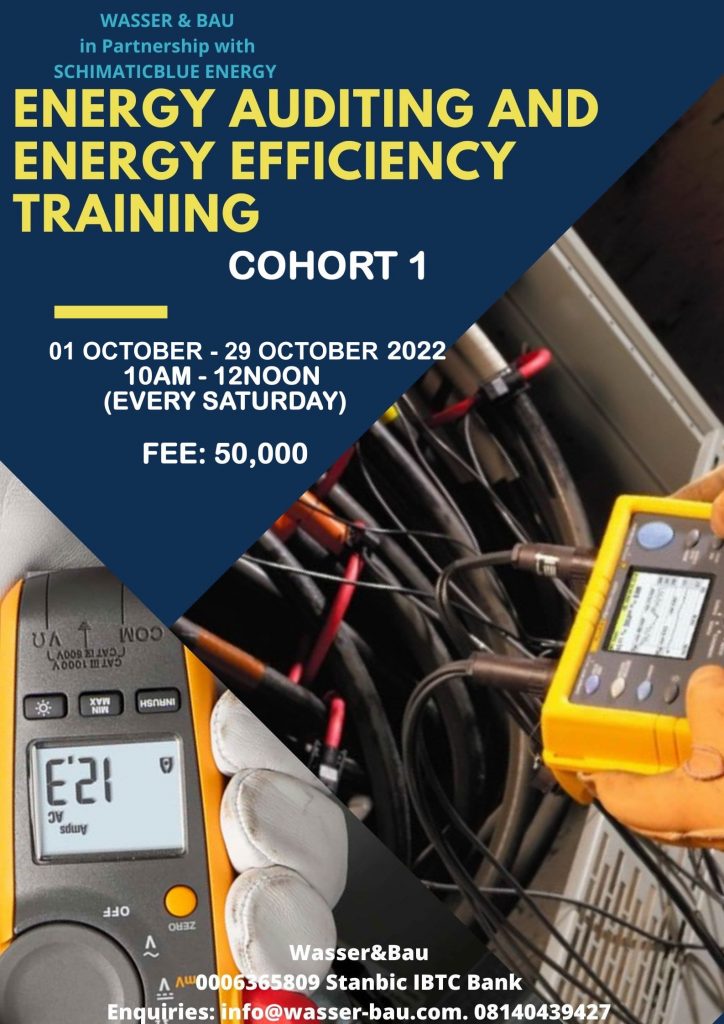
REGISTER NOW
01 OCTOBER – 29 OCTOBER 2022
ABOUT THE TRAINING
With Nigeria aiming to improve on efficient utilization of energy resource in the near future, Energy Auditing and Energy Efficiency is expected to take center stage in the country’s effort to attain energy sufficiency. Our mission is to training and build the capacity of the next generation of engineers that will provide services and technical knowledge in these areas and thereby creating jobs
The training will be in three (3) Modules covering the entire curriculum of the CEA and CEM exams.
Module 1- Energy Auditing
LEARNING OBJECTIVE
Upon completion of this module, participants should be able to;
- Follow a systematic step by step process to successfully deliver the audit.
- Understand the fundamental principles of producing a trustworthy energy audit report that is persuasive.
- Work with those operating the facility being audited to maximize the benefits of the audit with the resources available.
- Collect, analyze and interpret energy consumption data.
- Understand the critical information that needs to be collected on-site and how to find it.
- Understand which tools and instruments are needed to aid in site analysis and how to use them.
- How to ensure audits are undertaken safely.
Module 2- Energy Efficiency
LEARNING OBJECTIVE
Upon completion of this module, participants should be able to;
- Recognize key energy resources and the energy generated
- Examine and explain the process of transmitting energy
- Define Key Performance Indicators: energy intensity and efficiency, units and use.
- Learn different approaches for energy efficiency: operation improvement, operating conditions optimization and other significant improvement solutions (pinch analysis, alternative technology, process design, best available techniques)
- Learn where efforts should be focused so that companies can achieve ongoing energy savings
- Identify those energy uses that offer substantial energy saving potential
- Identify savings opportunities
- implement an analysis of current energy needs in an industrial plant and make improvement proposals
- Propose ways and means for reducing energy consumption and CO2 emissions.
Module 3 –Cost Analysis& Accounting
LEARNING OBJECTIVE
Upon completion of this module, participants should be able to understand and evaluate;
- Economic and financial aspects of RE and EE projects
- Project life cycle cost concept and basics of dynamic economics calculation for comprehensive EE & RE investment projects
- Economic, financial & bankability concepts
- RE and EE financial risks and how to evaluate, mitigate and avoid these risks
- Standards aspects of bankable RE and EE projects
- Investment grade calculation tool for RE and EE complex projects
- Calculating own energy performance/energy supply contracting projects
- Business evaluation models of RE and EE programs and project returns and risks
Date 01 OCTOBER – 29 OCTOBER 2022
Venue: online via Zoom (https://buff.ly/3ACKIdj )
Fee: 50,000
Time: 10AM – 12PM
Register via https://buff.ly/2OXmZPs
Find details here
Click here to register and participate
TO REGISTER AND PARTICIPATE, KINDLY PAY INTO THE FOLLOWING ACCOUNT
FEE
Fifty Thousand Naira only (₦50, 000.00) per participant.( 5 SATURDAYS)
Payment and Registration
Name: Wasser & Bau
Account No: 0006365809
Bank: Stanbic IBTC Bank
Below are video and pictures of past online training sessions:

INFRALAB COHORT 3
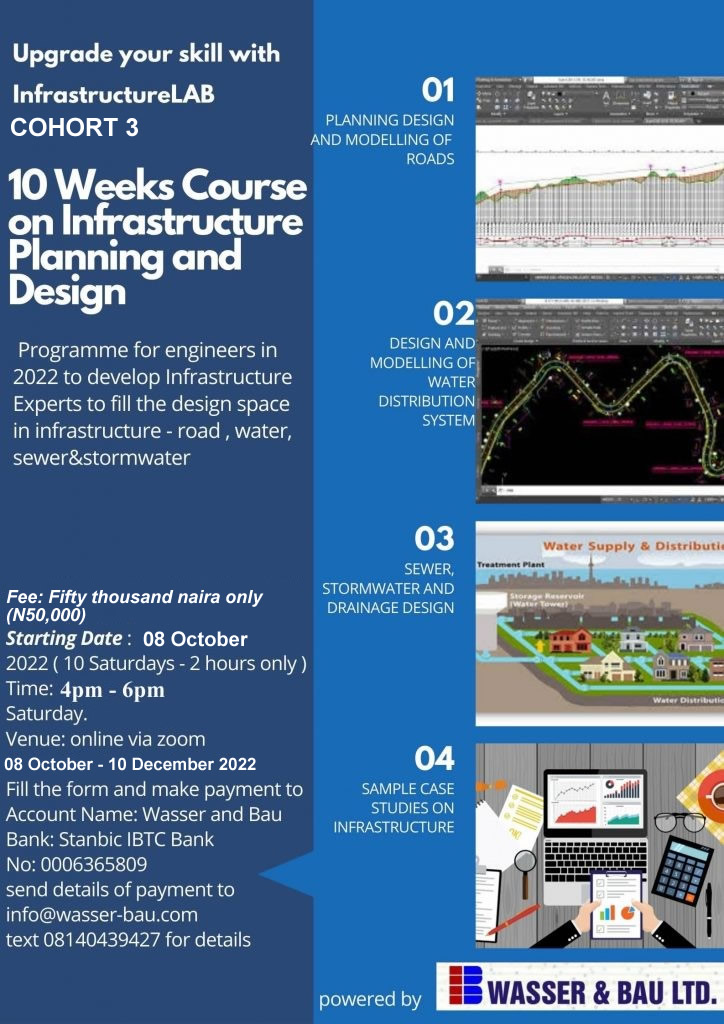
One of the major challenges facing Nigerian engineers is lack of capacity building.With the right training and exposure to international standard, Nigerian engineers will perform above their contemporary all over the world.With training materials from some of the best International Masters programmes in Infrastructure Planning and Water Resources Engineering from the University of Stuttgart, Wasser and Bau plans to build the capacity of the next generation of engineers with bias for water infrastructure (water, sewage, stormwater, road). This training will be conducted online every Saturday but with real-time support via WhatsApp and emails.
At the end of the training, participants will be able to plan design, model and simulate water, sewer, sand road infrastructure. Focus will also be on the practical software application.
Participants will be introduced to the various software such as:
EPANET – For Water Network Modelling and Simulation.
SWMM – For Stormwater and Sewer Network Modelling.
CIVIL 3D – For Roads, Highway and Railway Modelling.
EXCEL – Base Software, For Numerous Engineering Analysis Work.
Register and plan to attend by expressing your interest below here
https://forms.gle/w7G6mutR5XSKx67r8
Make payment and send details to 07030251116 to get your login details
NOTE: Wasser and Bau have been organizing this training on water, sewage and road as separate modules in the last 3 years with more than 1000 engineers already trained. Now, we have made it both flexible, simple, and compact into an online session every weekend to give every engineer the opportunity to participate.
Who Should Attend
Engineers, Surveyors, Land Planners & Developers interested in highway design, water supply and reticulation, stormwater and sewage network design .
This is an excellent class for new infratructure engineers, graduate trainees and old engineers who wants to update their knoweledge in modern tools and acquire new skill-set in infrastructure designAll classes will have a recorded session.
Learning Outcomes for Road Design
Function within the Civil 3D environment.
Import survey data and work with it.
Points, Surfaces, Parcel Labels, Horizontal alignments for sites: produce, amend and manage.
Produce a grading solution and grading quantities for sites.
Produce and amend site profiles.
Deal with transportation alignments and profiles, transportation assemblies and corridors, cross sections and quantities.
Create and manage plan sets, Civil 3D data.
Produce and manipulate site corridors and assemblies.
Produce and amend site pipe networks.
Learning Outcomes for Water Supply and Reticulation Design
Water Demand and Population projections
Water Collection.
Water Supply Systems
Pressure Zones.
Pumps.
Pumping Stations.
Power Boosters.
Water Storage.
Hydraulics for pumping design
Water Transmission and Distribution,
Dimensioning and calculation of a branched pipe system
Computer Modelling and Simulation with EPANET
Learning Outcomes for Stormwater and Sewege Network Design
Introduction of urban drainages, sewerages and their morphologies
Urban hydrology/ hydraulics in drainages and sewerages designs
Catchment zoning in urban drainage and sewerages designs
Wet and dry weather flows quantitative characterization
Data acquisition and interpretation in urban drainages and sewerages
Flood frequency analysis and flood return periods
Sewerages and urban drainages layout and designs (conventional method)
Flood routing using kinematic system and dynamic system
Cost Evaluation and Financial Appraisal of urban drainage Projects
Case study and computer application using EPA SWMM (modern based simulation).
Training Dates: 08 October – 10 December 2022 (10 Saturdays)
Venue: Only via zoom with support on Whatsapp group (continuous interactive session with the team of experts
Time: 4pm – 6pm every Saturday Starting 08 October 2022
Cost
To register, kindly send sms with name and email to Desk Officer on 08140439427 after making payment for the course fee of Fifty Thousand Naira only (N50, 000.00) for 10 weeks (Saturdays only)
Payment and Registration
Name: Wasser & Bau
Account No: 0006365809
Bank: Stanbic IBTC Bank
Further Inquiries: SMS to 08140439427 (whatsapp) or email info@wasser-bau.com.
Fill the form below but send payment details to the phone number to get your registration details
https://forms.gle/w7G6mutR5XSKx67r8
RENEWABLE ENERGY AND SOLAR PV DESIGN COHORT 2
22 OCTOBER – 19 NOVEMBER 2022

ABOUT THE TRAINING
The training will widely cover the design of photovoltaic systems, such as utility scale solar farms or residential scale systems (both on and off the grid). You will learn about the function and operation of various components including inverters, batteries, DC-DC converters and their interaction with both the modules and the grid.
After learning about the components, you will be able to correctly apply them during main design steps taken when planning a real PV installation with excellent performance and reliability. Through modelling, you will gain a deeper understanding of PV systems performance for different solar energy applications, and proficiency in estimating the energy yield of a client’s potential system.
WHO SHOULD ATTEND
Electrical Designers • Electrical Engineers • Sales Engineers • Electricians • Project Managers • entreprenuers • Installation and Operating Engineers requiring knowledge of PV Solar Systems • energy managers • infrastructure engineers and consultants
LEARNING OBJECTIVES
Module 1- Solar PV Application and Design
Upon completion of this module, participants should be able to;
- Distinguish between off-grid and grid-connected PV systems
- Distinguish, in principle, the difference between distributed and central PV systems and
- Name the different components used in grid-connected PV systems and off-grid PV systems
- Identify the different applications of off-grid PV systems.
- Identify the basic differences of PV cell types available.
- Describe the design of PV modules.
- Explain the function of PV inverters and name different types of inverters.
- Identify the different types of PV mounting structures and understand the fundamental requirements of mounting structures.
- Explain the basics of the photoelectric effect, calculate the output of a PV cell and name the main factors influencing the output of a PV cell.
- Name the basic electrical characteristics of a PV cell and interpret an I-V curve.
- Identify power output reductions on an I-V curve. Identify the impact of irradiance and temperature on PV cell or module voltage, current and power and describe how the I-V curve changes with changing irradiance levels and changing
Module 2- Solar PV System Sizing
Upon completion of this module, participants should be able to;
- Explain the basic concept of a mini- and hybrid power system
- Learn about different set-ups for PV-diesel hybrid systems
- Get to know a specific categorisation methodology for PV-diesel hybrid systems
- Define the concept and characteristics of load profiles and ddetermine what is peak load within a load profile
- Get to know the different concepts of PV penetration rate
- Understand the concept of energy shares in hybrid systems
- Understand a genset’s minimum load level for the operation of a PV-diesel hybrid system
- Describe the performance in a typical hybrid system on a sample day
- Understand the relationship of increasing PV capacity and its meaning for system complexity
- Be familiar with the purpose of storage
Module 3 – Cost Estimation of Solar Systems and Project Evaluation
Upon completion of this module, participants should be able to;
- Explain the investment cost structure of a PV project and identify the most important CAPEX items.
- Explain the operating cost structure of a PV project and identify the most important OPEX items.
- Identify the lifetime of different system components
- Understand direct and indirect costs in PV-diesel hybrid systems
- Learn the difference between CAPEX and OPEX in hybrid systems.
- Understand the relationship of system design to the CAPEX/OPEX ratio
- Recall the LCOE methodology
- Learn the LCOE calculation for diesel generator systems
- Understand how PV penetration influences LCOE of a hybrid system
- Understand comparison parameters for PV-diesel hybrid systems
All classes will have a recorded session
Date : Every Saturdays from 22ND October – 19th November 2022
(5 Weekends )
Venue: Online Via Zoom
Time: 10AM – 12noon
TO REGISTER AND PARTICIPATE, KINDLY PAY INTO THE FOLLOWING ACCOUNT
FEE
Fifty Thousand Naira only (₦50, 000.00) per participant.( 5 SATURDAYS)
Payment and Registration
Name: Wasser & Bau
Account No: 0006365809
Bank: Stanbic IBTC Bank
SEND EMAIL AND NAME TO 08140439427 to get the course materials in advance
CLICK THE LINK BELOW TO RECEIVE UPDATES AND CONFIRM INTEREST
Register in advance for this meeting:
https://us02web.zoom.us/meeting/register/tZMtduyvqDssE9QBdDGEag-RGTg7YDcTGJUa
Note: Only fully paid participants will be allowed to take part in the training
